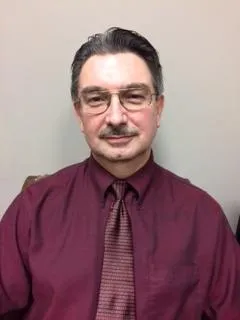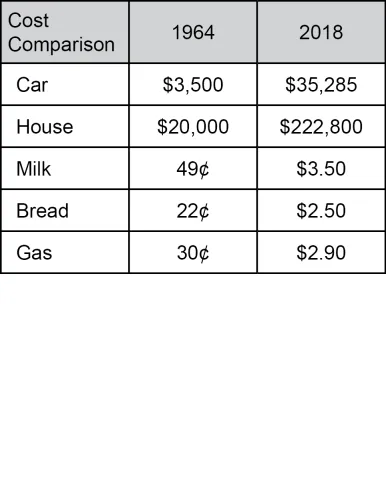Human Raccoons

I read a post on Facebook a few days ago that brought me a moment’s pause. Someone wrote that s/he never imagined ever entering a bank wearing a mask and asking for money.
Have you ever thought that if someone had predicted your future and told you certain things that you would have imagined yourself to be in a completely different place and circumstance than you presently find yourself?
An 18-year-old in 1968 would have been amazed to know that the median household income of $7,005 would be worth $52,782.68 adjusted for inflation in 2019. (Source: dqydj.com)
Undoubtedly, the teenager would think that if s/he could just live to be 69 that s/he would be rich!
Unfortunately, the cost of living also went up with the inflation of the dollar, and with this increase fell hopes of most 1960s teenagers being wealthy retirees. To put this in perspective, following is a cost comparison of some common items from 1964 to 2018 as provided by Farmers Almanac:
[See chart]
Roughly, prices have increased ten times in five decades.
I often think back to my junior English class at Horace Maynard High School. The class was American literature, and the teacher was Kenneth Venable. I liked most everything “KV” assigned us to read, with the notable exception of “Billy Budd,” “Sailor” and “The Red Badge of Courage.”
Of particular interest to me was the short story. KV assigned us one that has stayed in my mind these 39 years, and I go back and read it often. The story has taken on a new significance for me in light of the COVID-19 pandemic.
Nathaniel Hawthorne’s “The Minister’s Black Veil” told the story of a minister who shocked his congregation one Sunday morning by appearing before them in a black veil, with no explanation whatsoever.
Father Hooper wore the veil at all times—church services, funerals, weddings, and was never seen in public without the veil for the remainder of this life. There was so much speculation as to the reason Pastor Hooper covered his face, most of them dark suspicions of hidden sin. The minister would not even allow his betrothed to see his face, resulting in him living the rest of his life alone.
Father Hooper seemed odd to his parishioners because he wore a veil. Who among us would ever have thought that we would live in a day that we were thought a health threat to society and be denied admission to common events because we did not wear a mask, which in effect is nothing more than a veil?
When your church reopens for services, no one will think you strange if you appear in a mask, and your motives for doing so will not be questioned. You will not be thought selfish if you wear one for your own protection—you might even be thought considerate of fellow mankind, even should you be callous enough to care less whether they live or die, so long as you retain your own good health.
When I first read “The Minister’s Black Veil,” if someone had told me that world conditions would one day dictate that the general public wear masks, I doubt I could have foreseen the circumstances that would warrant such a practice.
I suppose the Nostradamuses among us would say that the story was Hawthorne’s “veiled” attempt at predicting the future, hindsight being the 20/20 that it is.
On a deeper level, how many of us wear figurative masks before our fellow men? How many of us are different at home than in public? In church than on the job? I have heard of several who seemed to act totally different in one location and situation than in their hometowns. There have been tales related of bigamists who had more than one family at the same time in different towns, and the families did not know the others existed.
Perhaps next time I’ll return to the adventures of our three country boys and their incident with the truant officer. Meanwhile, I leave you with these thoughts:
Beware of what you read! Who knows what portents for the future might so be decreed!
I'm reading a book about anti-gravity. I just can't put it down.
- Log in to post comments
